Depo-Medrol for cats is a powerful and long-acting injectable steroid medication. Veterinarians use it to manage a range of conditions, including inflammatory diseases, immune-mediated disorders, and allergic reactions in felines. This article provides a comprehensive overview of Depo-Medrol for cats, covering its uses, potential side effects, and essential considerations for cat owners.
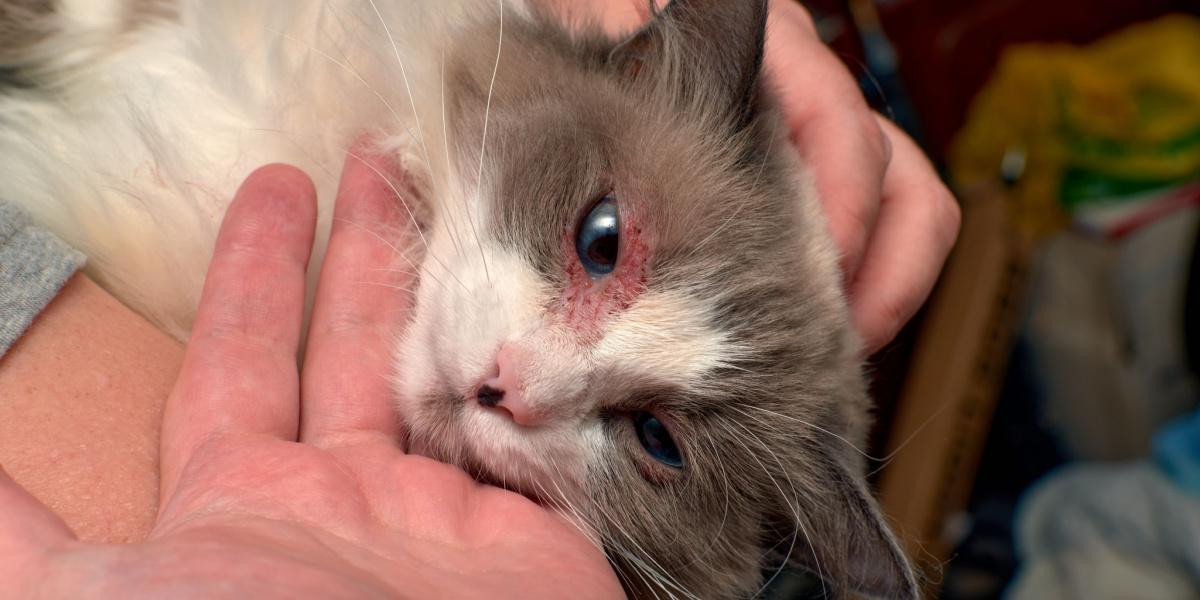 Cat with dermatitis highlighting the importance of addressing skin issues through veterinary care.
Cat with dermatitis highlighting the importance of addressing skin issues through veterinary care.
What is Depo-Medrol for Cats?
Depo-Medrol is the brand name for methylprednisolone acetate, an injectable corticosteroid. It is produced by Zoetis Animal Health and is a prescription medication available in different concentrations and bottle sizes. Unlike oral steroids, Depo-Medrol is administered as an injection, providing a long-lasting effect.
Corticosteroids like methylprednisolone are synthetic versions of hormones naturally produced by the adrenal glands. They play crucial roles in various bodily functions, including the stress response, immune system regulation, and inflammation control. In veterinary medicine, corticosteroids are primarily used for their anti-inflammatory properties, helping to reduce swelling and inflammation. At higher doses, they can also suppress the immune system.
Methylprednisolone is a potent steroid, significantly stronger than hydrocortisone, approximately four to five times more so. While methylprednisolone is available in oral and injectable forms, Depo-Medrol specifically refers to the long-acting injectable formulation. This long-acting nature is both a benefit and a consideration when using Depo-Medrol for cats.
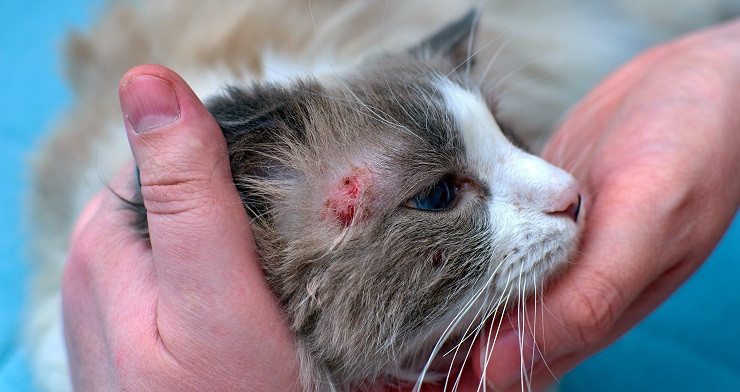 Medication for skin disease in cats, an essential aspect of feline healthcare and treatment.
Medication for skin disease in cats, an essential aspect of feline healthcare and treatment.
How Does Depo-Medrol Work and When Is It Used?
Depo-Medrol is utilized in cats for conditions that would typically be treated with oral steroids like prednisolone. These conditions fall into three main categories:
- Inflammatory Conditions: Depo-Medrol can help manage inflammation resulting from injuries or infections.
- Immune-Mediated Conditions: In these diseases, the cat’s immune system overreacts and attacks its own body. Depo-Medrol can help suppress this overactive immune response in conditions affecting blood cells (like anemia or thrombocytopenia), skin, or other organs.
- Allergic Conditions: Depo-Medrol can alleviate symptoms of various allergies in cats, including skin allergies like atopic dermatitis, inflammatory bowel disease (IBD), and feline asthma.
- Certain Cancers: In some specific types of cancer, such as lymphoma, corticosteroids like Depo-Medrol can be part of the treatment plan to help manage symptoms and improve quality of life.
While oral steroids like prednisolone offer more flexibility in dosing and adjustments, Depo-Medrol becomes a valuable option when administering oral medication to a cat is challenging. Cats are notorious for being difficult to pill; they may refuse to swallow tablets, spit them out, or drool excessively. This can make consistent oral medication administration stressful for both the cat and owner, and sometimes even pose a risk of injury to the owner from bites or scratches.
Veterinarians often consider Depo-Medrol when oral medication is impractical or causes significant stress. A single injection of Depo-Medrol provides therapeutic effects that can last for weeks or even months. However, the potency and prolonged action of Depo-Medrol also mean that potential side effects can be more pronounced and require careful monitoring. Therefore, it is often considered a secondary option after oral steroids have been considered.
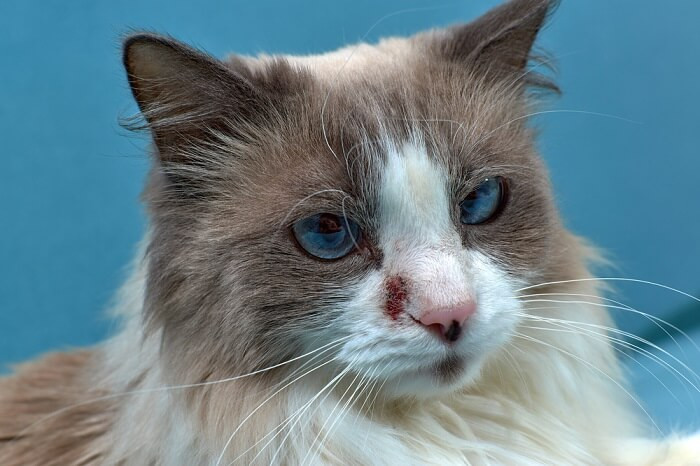 Dermatitis in cats, a common skin condition, highlighting the importance of skin health in feline care.
Dermatitis in cats, a common skin condition, highlighting the importance of skin health in feline care.
Potential Side Effects of Depo-Medrol in Cats
Cats are generally less susceptible to the short-term side effects of steroids compared to dogs. However, because Depo-Medrol is a potent and long-acting steroid, side effects are more likely to be observed, especially with repeated use.
Common side effects associated with steroid use in cats include:
- Increased Thirst and Urination: Cats may drink and urinate more frequently.
- Increased Appetite: Steroids can stimulate appetite, potentially leading to weight gain over time.
- Gastrointestinal Upset: Diarrhea is the most common digestive issue in cats, but vomiting or decreased appetite can also occur. Stomach ulcers, though more common in dogs, are a potential risk as well.
These side effects are often mild and temporary, resolving once oral steroid treatment is stopped. However, with Depo-Medrol, the effects can persist for weeks to months due to its slow release, and the intensity of side effects can vary between individual cats. Even with a single injection, the long-term effects of steroid use need to be considered.
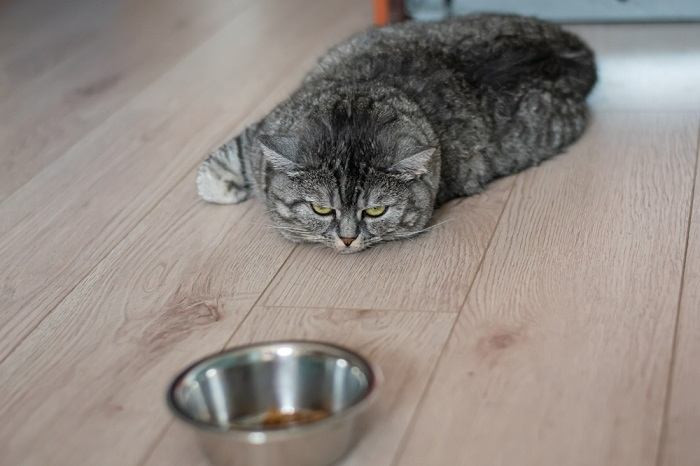 Cat refusing to eat underscoring the significance of addressing appetite and nutrition concerns in cats
Cat refusing to eat underscoring the significance of addressing appetite and nutrition concerns in cats
Risks and Important Considerations for Depo-Medrol Use
Depo-Medrol, being a potent and long-acting steroid, requires careful consideration, particularly in certain situations:
- Infections: Using Depo-Medrol in cats with active bacterial or viral infections, especially severe ones, should be done cautiously. Steroids can suppress the immune system, potentially hindering the body’s ability to fight off infections. While oral steroids are sometimes used with antibiotics for certain infections, Depo-Medrol’s prolonged effect and potency may pose a higher risk.
- Diabetes Mellitus: Corticosteroids can cause insulin resistance, making it harder for the body to regulate blood sugar. Long-term steroid use can lead to the development of diabetes in cats. Overweight or obese cats are at a higher risk. Depo-Medrol can also contribute to weight gain, further increasing diabetes risk.
- Congestive Heart Failure: In cats with pre-existing heart conditions, especially heart disease, Depo-Medrol can increase the risk of congestive heart failure. This occurs when fluid builds up in the lungs and other areas of the body.
Due to these risks, veterinarians often perform screening tests before using Depo-Medrol, especially for long-term treatment. This may include blood glucose tests to assess diabetes risk and heart evaluations (via chest X-rays or heart ultrasound) to check for underlying heart conditions.
Depo-Medrol is generally avoided in pregnant cats and used with caution in lactating cats.
 Cat in a pouncing position, showcasing its agility and playfulness
Cat in a pouncing position, showcasing its agility and playfulness
Drug Interactions and Overdose Information
Depo-Medrol can interact with several other medications. It’s crucial to inform your veterinarian about all medications your cat is receiving before starting Depo-Medrol. Potential drug interactions include:
- Other Immunosuppressants: Combining Depo-Medrol with other drugs that suppress the immune system, such as cyclosporine, can increase the risk of infection.
- Non-Steroidal Anti-Inflammatory Drugs (NSAIDs): Using NSAIDs like meloxicam or robenacoxib concurrently with steroids can increase the risk of gastrointestinal ulcers.
- Diuretics: Certain diuretics, like furosemide, can interact with steroids.
- Insulin: In diabetic cats, Depo-Medrol can increase insulin resistance, potentially requiring adjustments to insulin dosage to manage blood sugar levels effectively.
If a cat is receiving Depo-Medrol for immunosuppression, vaccination protocols need to be carefully considered, particularly for live-attenuated vaccines. The immune system may not respond adequately to the vaccine.
Overdosing with Depo-Medrol is unlikely as it is administered by a veterinarian. However, even at appropriate doses, side effects can occur. If you are concerned that your cat is experiencing adverse effects after a Depo-Medrol injection, contact your veterinarian immediately. You can also reach out to animal poison control centers like the ASPCA Animal Poison Control Center or Pet Poison Helpline for guidance.
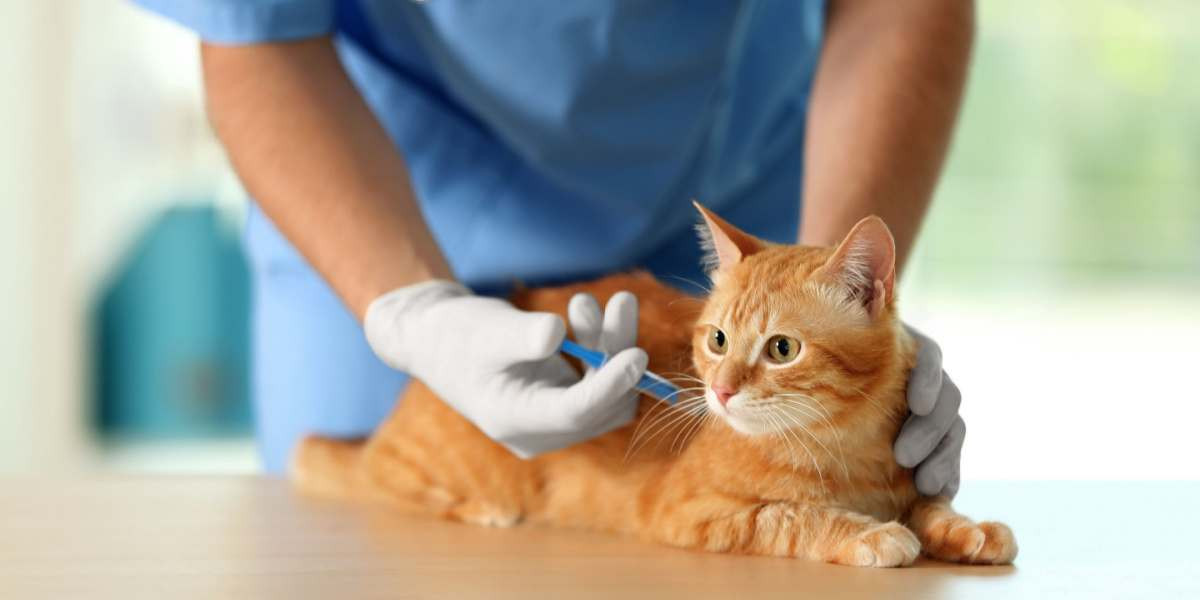 Veterinarian administering a vaccination to a cat at a veterinary clinic, ensuring the cat
Veterinarian administering a vaccination to a cat at a veterinary clinic, ensuring the cat
Depo-Medrol Dosage and Administration for Cats
Depo-Medrol is FDA-approved for intramuscular (IM) injection in cats. The typical IM dosage range is between 10 mg and 20 mg per cat, but the precise dose depends on the specific condition being treated and the veterinarian’s judgment. Depo-Medrol comes in different concentrations, which will affect the injection volume.
While labeled for IM use, veterinarians sometimes administer Depo-Medrol subcutaneously (SQ), under the skin. Some veterinarians find the SQ route less painful for cats. However, subcutaneous absorption is slower and may be less predictable in onset. Despite this, for a long-acting medication like Depo-Medrol, the slightly slower onset may not be a significant drawback.
The goal of steroid therapy is always to use the lowest effective dose at the longest intervals needed to control the cat’s symptoms. For chronic conditions, Depo-Medrol injections are often given every 4 to 6 weeks, or more frequently if symptoms reappear sooner.
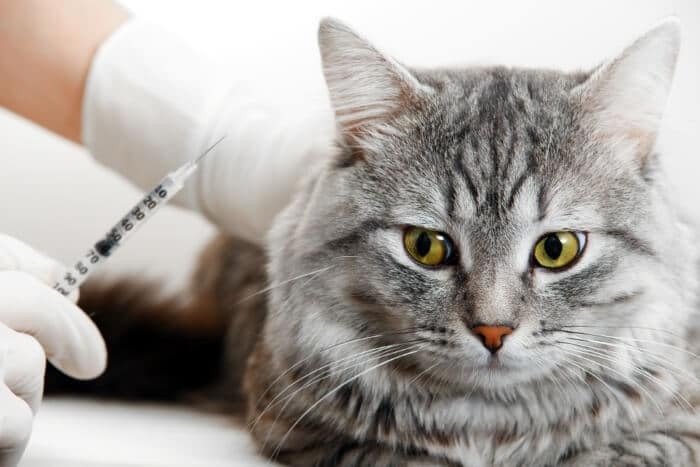 Convenia injection for cats, an antibiotic treatment administered by a veterinarian to address feline health issues
Convenia injection for cats, an antibiotic treatment administered by a veterinarian to address feline health issues
Final Thoughts on Depo-Medrol for Cats
Depo-Medrol is a potent, long-acting steroid that can be a valuable tool in managing certain conditions in cats, particularly when oral medication is difficult to administer. While effective, its potency and long duration of action necessitate careful consideration of potential side effects and risks, especially with long-term use. Cat owners should discuss the benefits and risks of Depo-Medrol with their veterinarian and explore alternative treatments if available. Close monitoring and open communication with your vet are essential when your cat is receiving Depo-Medrol.
Drug Dosing Disclaimer: This article provides general information and should not be considered a substitute for professional veterinary advice. Dosing information is provided for FDA-approved uses in cats and based on label guidelines. Off-label medication use and appropriate dosing should only be determined by a licensed veterinarian. Always consult with your veterinarian to determine the best course of treatment for your cat.
Also Read: 10 Subtle Signs Your Cat May Be Sick
 Sick cat highlighting the importance of recognizing and addressing feline health concerns.
Sick cat highlighting the importance of recognizing and addressing feline health concerns.
Frequently Asked Questions About Depo-Medrol for Cats
What is the primary purpose of Depo-Medrol injections for cats?
Depo-Medrol is a long-acting steroid injection primarily used when oral steroid administration is challenging or not feasible for cats. It is effective in managing inflammatory conditions, immune-mediated diseases, and allergic reactions, as well as certain types of cancer in felines. Its long-acting nature makes it convenient for long-term therapy in difficult-to-medicate cats.
How long does a Depo-Medrol injection typically last in cats?
The duration of effect for a Depo-Medrol injection varies among cats due to individual differences in absorption and metabolism. As an intramuscular injection designed for slow absorption, it generally provides relief from symptoms for weeks, potentially up to a couple of months in some cats. Monitoring for the return of disease signs is crucial to determine the optimal interval for repeat injections, which is often every 4 to 6 weeks for chronic conditions, or sooner if needed.
What are the most common side effects cat owners should watch for after a Depo-Medrol shot?
While cats are generally less prone to short-term steroid side effects compared to dogs, Depo-Medrol’s long-acting nature can make side effects more noticeable. Common side effects include increased thirst, increased urination, increased appetite, and potential weight gain. Digestive upset, such as diarrhea or vomiting, can also occur. More seriously, long-term or repeated Depo-Medrol use can increase the risk of diabetes mellitus, especially in predisposed cats, and congestive heart failure in cats with underlying heart conditions. Close monitoring for these signs and regular veterinary check-ups are important.

